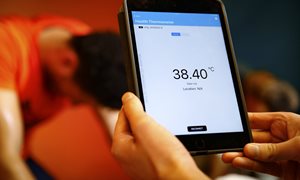
We congratulate Vincent Aengevaeren! After defending his thesis entitled: ‘Potential Detrimental Effects of Exercise on the Heart’ on 28 October, Vincent attained his PhD degree with honors. Vincent had been appointed on a RIHS Junior Researcher grant.
Description
The beneficial effects of exercise are indisputable and the current physical activity recommendations suggest more exercise is better. Nevertheless, there is discussion whether one can exercise too much. Research in this thesis showed that the most active middle-aged male athletes more often had coronary atherosclerosis, although of a more benign composition, than their less active peers. Also, myocardial fibrosis was relatively common in athletes, but predominantly present in specific locations which are likely less detrimental. The consequences of these adaptations is currently unclear and require further research. Additionally, exercise-induced increases in markers of myocardial injury were associated with future mortality and cardiovascular events. In the future, these findings may allow for early detection and treatment of vulnerable individuals. Exercise can hurt the heart of certain vulnerable individuals, however the benefits of exercise far outweigh the harms for most individuals.
Biography
Vincent Aengevaeren (1991) studied Medicine at the Radboud University and obtained his medical degree with first-class honors in 2015. The research in this thesis was performed at the department of Physiology, within the Radboud Institute for Health Sciences. Currently, he is a postdoctoral fellow at the Physiology department. In 2021, he will start with his cardiology training at the Radboudumc.
Related news items

Grants for heart and kidney research Two awards to Radboudumc in Open Competition ENW-XS
21 July 2022Two researchers from the Radboudumc receive a grant from the NWO within the Open Competition of the Exact and Natural Sciences. They are Thijs Eijsvogels, who studies the heart, and Pieter Leermakers, who studies the kidneys.
go to page
Your heart rate as a thermometer Research Olympic athletes will be followed up during 4Daagse
18 July 2022Body temperature can be determined from heart rate. This is what research by the Radboudumc among Olympic athletes shows. Athletes can use this method during training to eventually perform better in the heat. The technique is now being further investigated among participants in the 4Daagse.
go to page
Young Investigator Award for Esmée Bakker
14 April 2022 Esmée Bakker received the Young Investigator Award for her abstract ‘Acute and long-term mortality rates among participants of mass-participation sports events versus the general population.’ go to page
Esmée Bakker obtained a Marie Skłodowska-Curie grant
29 March 2022 Esmée Bakker obtained a Marie Skłodowska-Curie European Postdoctoral Fellowships (160k) of the Horizon 2020 of the European Union. go to page
Exercise program appears to be a good alternative to surgery for chronic chest pain Reduced risk of other conditions, hospitalizations, and mortality
9 December 2021 Patients with chronic chest pain may benefit more from following an exercise program than from surgery in which doctors place a stent. Data from over 18,000 patients show a reduced risk of mortality, hospitalizations and other conditions. go to page
